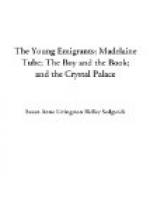Hans was deeply moved by these words of his poor forsaken mother, and he also prayed. He prayed that her hopes might be fulfilled; and that he might be a comfort and a blessing to her old age; and he said to himself, that he would henceforth lead a life of usefulness and peace; and so he went forth, strong in purpose, yet full of tenderness and love.
After this parting, many years passed over Frau Gensfleisch’s head ere she beheld her son again; and few and far between were the tidings of him that reached her cottage. Long and weary years were they to her; and the hope so long deferred of seeing him again made, indeed, her heart grow sick. Many and many a time would she go on foot into the town to make inquiries of Father Gottlieb as to whether aught had been heard of the absent one; and if by chance she was told of some traveller who had come into the town from the south, she would go there though ever so weak and weary, and never rest until she had found the stranger out, to question him herself about all the youths whom he might have fallen in with, in the hope that her Hans might have been one of them.
Through Father Gottlieb she heard of his safe arrival at Worms; and these tidings came written on a slip of parchment by Hans himself, and was brought by a travelling monk who was going about to collect alms, and who called at the convent of St. Gothard in Mainz. In return, Frau Gensfleisch got one of the monks to write for her a letter, in which she told Hans of the recovery of the youth whom he had wounded, and begged him to return to her. This letter was given into the charge of the same monk, who, after visiting several other cities, was likely to return to Worms; but as it did not bring Hans home again, no one felt sure that it had ever reached him.
Several years passed without any more tidings of her son reaching Frau Gensfleisch, until there called at her cottage one day a pilgrim who was returning from the Holy Land, and was on his way to the city of Treves, to which he was taking some holy relics. He brought to Frau Gensfleisch a small bag of silver coin, as much in value as the money she had given to Hans at his departure. The pilgrim told her it was sent by a youth in the town of Strasburg, who sent with it love and greeting, and directed him where to find her cottage. The pilgrim had forgotten the name of the youth, he said, but that he had marked the little bag with a mark that he was sure his mother would know; and sure enough she did; for there on the leather had been imprinted the very same letter =g= which Hans had saved from the fire, when his other letters were burnt. Frau Gensfleisch knew by this that the money came from Hans, and her heart beat for joy at the knowledge that he was well and rich, and above all that he had not forgotten her.




